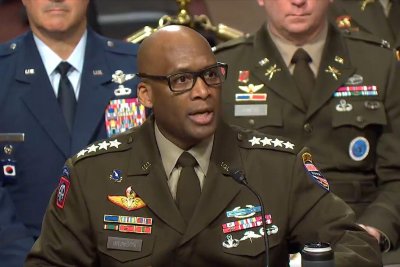
Army Gen. Xavier Brunson, commander of U.S. Forces Korea, told a U.S. Senate Armed Services Committee posture hearing in Washington on Thursday that reducing American troops in South Korea would be “problematic.” Photo courtesy of U.S. Forces Korea
SEOUL, April 11 (UPI) — As North Korea continues to develop its weapons programs and strengthens military ties with Russia, a reduction of U.S. troops based in South Korea would be “problematic,” the commander of U.S. Forces Korea said.
Army Gen. Xavier Brunson made the comment during a Senate Armed Services Committee hearing on Thursday, amid concerns that the administration of President Donald Trump might look to downsize the U.S. military footprint in South Korea and elsewhere.
“We pay for U.S. military in Europe, and we don’t get reimbursed by much. South Korea, too,” Trump said while speaking to reporters in the Oval Office Wednesday.
During his previous term in office, Trump called for massive increases in Seoul’s financial contribution for the 28,500 U.S. forces stationed in Korea, at one point reportedly demanding a 400% hike from then-President Moon Jae-in and dragging negotiations out for months.
Seoul signed a new five-year cost-sharing agreement with Washington in October, but Trump has suggested he is looking to renegotiate the terms of the deal.
On Tuesday, he wrote on his Truth Social platform that he had spoken with South Korean acting President Han Duck-soo about trade issues, including “payment for the big time Military Protection we provide to South Korea.”
Brunson told the Senate committee that U.S. troops in South Korea not only deter North Korean threats but are a crucial line of defense against Russia and China as well.
“They are a critical component to ballistic missile defense in the region,” Brunson said. “They are critical to helping Indo-Pacific Command see, sense and understand threats to the north and to deter a great many adversaries.”
“To reduce the force becomes problematic,” he said.
Brunson, who also leads the South Korea-U.S. Combined Forces Command and U.N. Command, warned of North Korea’s advancing nuclear and weapons programs and its growing military ties with Russia.
“The DPRK has shipped millions of artillery rounds and dozens of ballistic missiles to Russia over the last year as well as deployed more than 10,000 troops to fight against Ukrainian forces,” Brunson wrote in a statement submitted to the committee.
The Democratic People’s Republic of Korea is the official name of North Korea.
“In return, Russia is expanding sharing of space, nuclear, and missile-applicable technology, expertise and materials to the DPRK,” Brunson wrote. “Russia’s expanded cooperation will enable advancements of DPRK’s weapons of mass destruction program across the next three to five years.”
Pyongyang has demonstrated an ability to simultaneously provide external military support while simultaneously advancing its own domestic capabilities, Brunson added, boosted by cybercrime operations, weapons exports and illicit trade.
In February, North Korean hackers pulled off the largest cryptocurrency heist in history, stealing $1.5 billion of virtual assets from crypto exchange Bybit.
“Contrary to predictions of collapse due to food shortages, the DPRK is more stable than ever, bolstered by substantial resources generated through new revenue streams,” Brunson wrote.
During the hearing, U.S. Indo-Pacific Command Commander Adm. Samuel Paparo Jr. also warned that a reduction in American troops would raise the likelihood of a North Korean invasion.
“With the loss of the force on the Korean Peninsula, there’s a higher probability that [North Korea] would invade,” Paparo said.
“Inherently, it would reduce our ability to prevail in conflict,” he added.